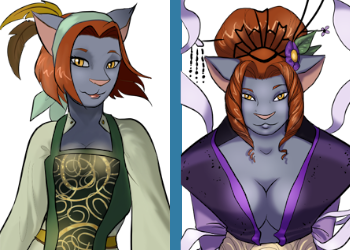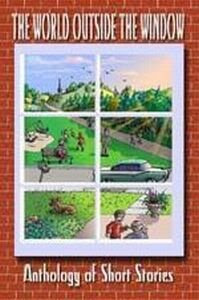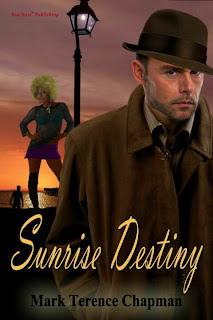The Basics
– Mark Terence Chapman and Mark T. Chapman (nonfiction)
– Genre(s): Science fiction/fantasy, nonfiction (computer technology, writing, investing)
– Publisher(s): Red Rose, RJ Buckley, Amazon Shorts
To Other Authors
– What are the three MOST important pieces of advice you would give to a brand new author?
- 1) Learn the rules of grammar, syntax, and punctuation. Editors won’t publish a story simply because it has perfect grammar, syntax, and punctuation—however they will reject stories that have excessive numbers of errors in those areas. Editors are overworked and underpaid. They’d rather accept an exciting story that requires minimal editing than one they’ll have to slave over for months. Once you understand correct grammar, etc., edit and polish your stories over and over. Never submit a first draft (or even a second draft) of anything. The more you polish, the greater your chances of having your piece accepted.
- 2) Join one or more workshopping groups (such as critters.org or zoetrope.org), where you can exchange stories with other writers and have them critically reviewed. This is by far the best method I’ve found for improving your writing. By seeing what reader/writers find awkward or unbelievable about your characters, plotlines, dialog, pacing, narrative, and so on, you’ll quickly learn what to avoid, as well as what about your writing works well (humor, tension, and clever escapes, for example).
- 3a) Always accept constructive criticism with grace. Critiquers are much more likely to tell you exactly what needs work if they know you’ll accept what they say without feeling personally offended. Remember, a comment like, “The dialog in this scene is stiff. You need to loosen up the wording and have them show more emotion” does not mean, “You’re an idiot and you can’t write.” You have to understand and accept the difference between critiquing a story and critiquing the writer.
- 3b) Always reciprocate critiques. Critiquing a story is a commitment of time and creative energy that reviewers could be spending on their own writing. If a critiquer has a story up for review, read it and reciprocate. If a critiquer has nothing ready for review, either make a mental note to watch for a story in the future to critique, or critique someone else’s story this week (pay it forward) and accumulate “karma points” toward future critiques. Remember, the more you critique other authors’ stories, the more likely they will critique yours in turn. The more feedback you get for your story, the better your chances of fixing the problems before you submit to a publisher and the better your chances of making a sale.
– What’s your favorite way to advertise?
- I don’t know that I have a favorite way. But with all the choices available, I mainly try to stick to the inexpensive ones to give me the greatest bang for the buck: posting to online genre discussion groups; obtaining book reviews (preferably via ebook copies that cost me nothing to give out); newsletters that I email to readers; business cards, postcards (with a book cover on one side and a jacket blurb and ordering info on the other), and bookmarks that I give away as freebees; and so on. I don’t rule out buying ad space in genre magazines, but those tend to be expensive; so I’ve stayed away from them so far. (That may change as my royalty payments increase.)
– What hard-knock lesson did the publishing world teach you (can be your own experience or someone else’s that you learned from)?
- It’s best to sell to a publisher with a track record. While it’s exciting to “get in on the ground floor” with a brand new publisher, it’s also risky. The publisher may be a poor businessperson or undercapitalized and go under within a year, or he/she may be dishonest. Even if the publisher is honest and capable, without the right industry contacts sales may be meager for several years.
- Before signing a contract, check out the publisher’s references at such sites as Preditors & Editors (http://anotherealm.com/prededitors/peba.htm) or author Piers Anthony’s list of Internet publishers (http://www.hipiers.com/publishing.html). A “not recommended” label doesn’t necessarily mean the publisher is bad (you don’t know the reason for the warning—it may be one complaint from a disgruntled author or reader), but it certainly should be a red flag.
- If you have access to inexpensive legal advice (via something along the lines of Pre-Paid Legal, Inc.) it would be a good idea to have a lawyer peruse your contract to be sure you’re not selling more than you want to (audio, movie, and overseas rights, for example).
For the Readers
– What are you reading, if anything, at the moment?
- Nothing, unfortunately. I’m too busy writing, editing, and critiquing other authors’ works-in-progress.
– Do you prefer ebooks or print for your reading pleasure?
- Currently, paperbacks over trade books, hardcovers, or ebooks. But that’s largely because I spend all day reading/writing on a laptop, so it’s nice to get away from an electronic screen for an hour or two.
– Name three of your all-time-favorite, read-them-over-and-over books.
- I rarely reread books. (My philosophy is that every book I reread means one less new book I’ll get to read in my lifetime.) The few that I reread even once have to be special to me in some way. I’ve read Isaac Asimov’s Foundation trilogy (the original trilogy) three times over the past 30+ years, and I’ve read Tolkien’s Lord of the Rings trilogy twice. Both are epic sagas that take place across great expanses of time and space. I’m sure there are two or three other books I’ve reread, but I can’t think of any off-hand.
Idle Curiosity Compels Me to Ask
– What inspired you to be a writer?
- There was no one thing that did it. I always did well in reading, spelling, grammar, and creative writing classes in school. I enjoyed writing, but I didn’t really have any plans to be a writer. Early on, I wanted to be an architect and, later, a lawyer. But, as they say, life is what happens when you’re not paying attention.
- After college, I got a job with IBM in tech support. As part of my job, I wrote occasional “how-to” docs for our database (so other tech support people wouldn’t have to reinvent the wheel every time a customer called with the same problem). Over the years, I wrote hundreds of these docs. One day it occurred to me that if we gave the docs to customers to use, they could solve many of their own problems without having to call for tech support. So in 1989 I created a series of online books (years before PDF existed) and posted them to IBM’s BBS (pre-Web). Thousands of people downloaded and used them. Then tens of thousands. By 1991, more than 30,000 people worldwide were using them.
- IBM awarded me with $150,000 cash for my efforts (which helped save the company millions in tech support calls avoided). Encouraged by that, I turned one of those online books into a printed book that McGraw-Hill published as the “OS/2 Power User’s Reference Guide” in 1995. (It’s still listed on Amazon.) By 1998, I started thinking about writing novels, but I couldn’t think of a story to write, so I turned to children’s picture books. Then in 2003 I wrote my first sci-fi novel (The Tesserene Imperative; TTI), followed by a prequel (The Mars Imperative; TMI) in 2004. (I also ghost-wrote half of another nonfiction book about computer hardware: “Exploring IBM Server & Storage Technology, 6th Edition” for Maximum Press.) I began a third novel—a sequel to TTI) in 2005 and wrote a novella. In 2006, I wrote a fourth novel (Sunrise Destiny), and in 2007, I expanded the novella into my fifth novel (My Other Car is a Spaceship). (I’m currently working on my sixth, and trying to finish that pesky third one.)
- While writing Spaceship, I sold TMI and TTI. Both were published late in 2007. Unfortunately, the publisher folded in early 2008, leaving me (and the other authors) in the lurch. But then in May 2008 I sold Sunrise Destiny to another publisher (Red Rose). It’s due to be published in 1Q/09.
- So, you see, my writing career just sort of happened. I certainly didn’t plan it this way from birth—or even from college.
– What do you do immediately after finishing a manuscript?
- For a novel, I usually take a couple of weeks off, then go to work on the second draft. My first draft is primarily about getting the plot written. In draft 2, I go back and reread the entire manuscript from front to back for the first time. I fix continuity errors (eye color changes, name spelling changes, and the like) and look for plot holes to fill. But mainly I flesh out scenes that are too skimpy (more description, more dialog, more action—whatever’s needed), and add scenes if necessary.
- When I’m done with the second draft I take a month or two off or work on something else, like a short story. The idea is to flush the novel out of my brain, so when I start the third draft I don’t remember all the details as I’m reading. Invariably, I come across passages that are confusing or incomplete that I hadn’t noticed before when the story was still fresh in my mind. The third draft is all about editing out the slow parts, polishing the prose so it shines, spicing up scenes that are supposed to be exciting but aren’t (or at least aren’t exciting enough), cleaning up dialog that sounds preachy or awkward, and so on. This is my “final” draft in the sense that after this one I feel ready to begin trying to sell the book. (I may still produce another draft or two to fix problems reported by critiquers I show the manuscript to, but generally the changes are minor spit-and-polish edits, not something major like plot holes.)
– Do you talk to your characters or your muse or both?
- Do I look ready for the rubber room? Seriously, I don’t talk to them, but they do talk through me. When I’m writing dialog for them, I hear it in their voices as they tell me what to type.
Promo Section
Learn More
– Website: http://markterencechapman.com/
– MySpace & Facebook:
http://myspace.com/tesserene
http://www.facebook.com/profile.php?id=528514231
– Blog/Newsletter: http://tesserene.blogspot.com
– Yahoo Group: http://groups.yahoo.com/group/MarkTerenceChapmanBooks
Thanks, Mark!
Join me next week for Shelley Munro’s interview.



What a wonderfully comprehensive interview! Enjoyed the advice, Mark. Always like to see how other authors manage their WIPs. Thank you for sharing your experience, and thank you, Renee, for bringing us this interview.